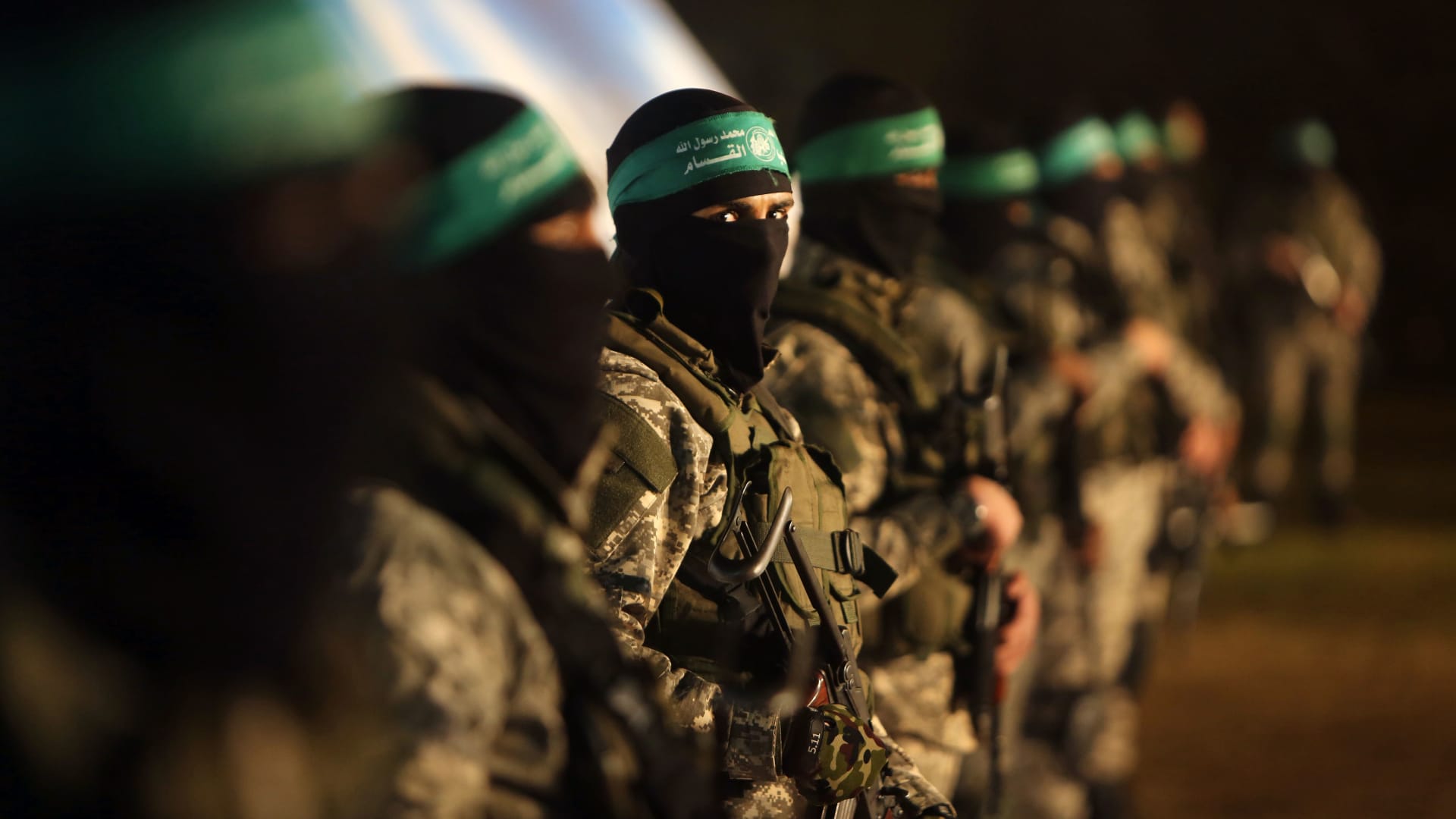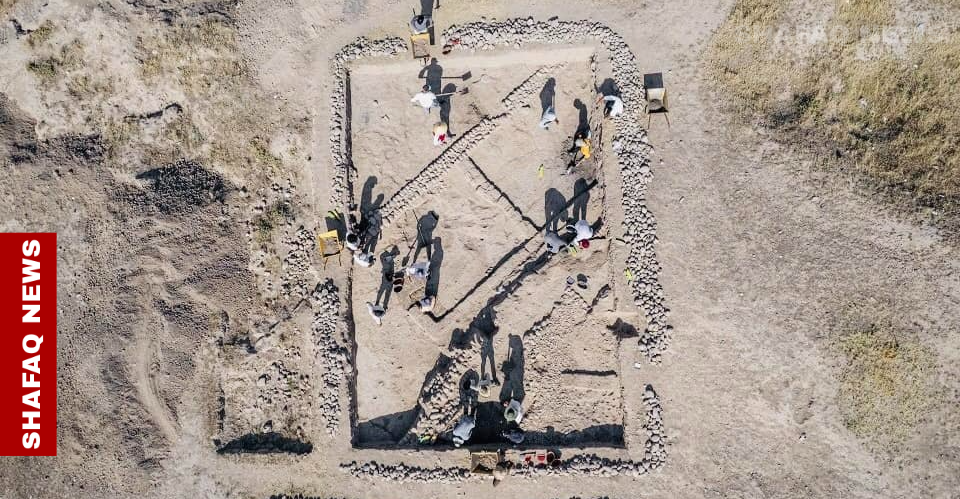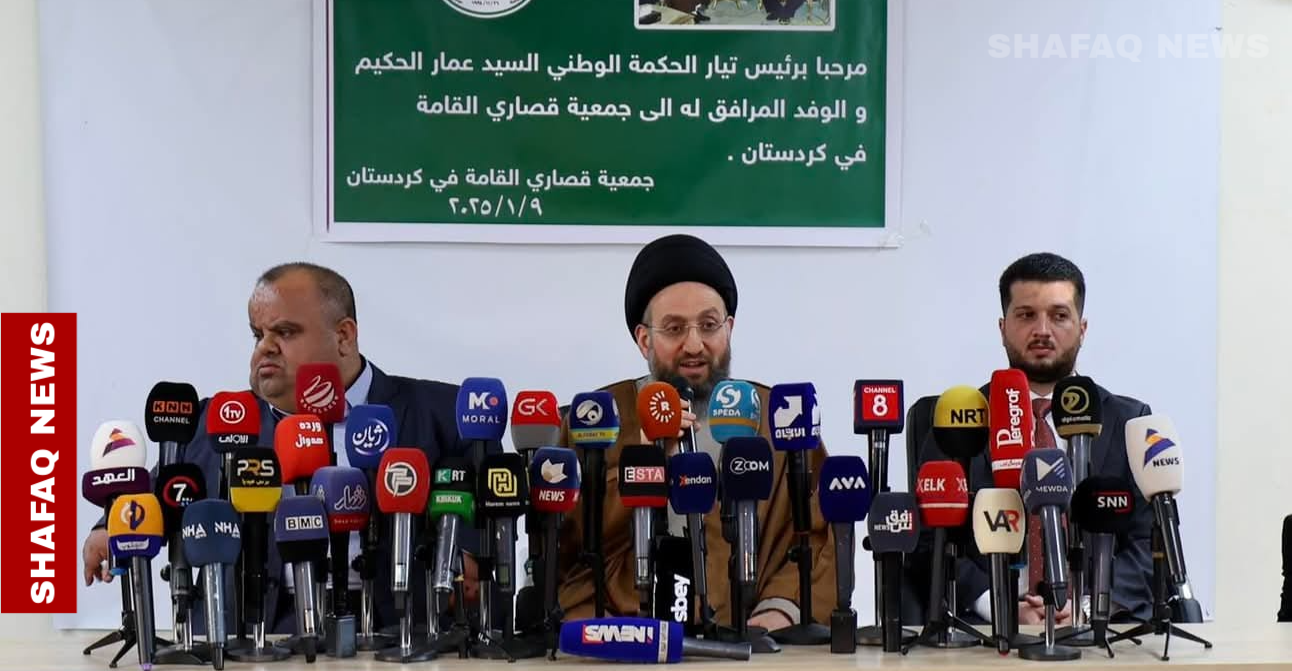Differences among PMF members over the Gaza crisis: Report

Shafaq News / A report published by "Amwaj Media" revealed details of a "rare" visit by a delegation from the Palestinian Hamas movement to Iraq on October 27th last year. The visit included meetings not with officials in Mohammed Shia Al-Sudani's government but with his advisors. The report noted that the delegation requested Baghdad to enhance its political initiatives, including urging Lebanon to strengthen Hezbollah's involvement in the military confrontation with Israel.
The following is the text of the report:
In a rare visit, a Hamas delegation arrived in Baghdad on Oct. 27 at the invitation of Iraqi Shiite armed groups. The five-member group was headed by senior Hamas figure Osama Hamdan, who was notably accompanied by Mohammed Al-Hafi from the Palestinian movement’s Bureau for Arab and Islamic Relations.
Ambiguity has loomed over the details of the visit, which comes amid concerns that Iraq may be dragged into a regional conflagration sparked by the Hamas-Israel war in Gaza. However, multiple informed sources confirmed to Amwaj.media that the Palestinians met with a number of Iraqi leaders.
The trip also notably follows what was supposed to be a historic tour of Iraq last month by Hamas political bureau chief Ismail Haniyeh. That visit was canceled at the last minute on Oct. 7 after news emerged that Hamas fighters had stormed Israeli communities near Gaza.
Behind closed doors
The Hamas delegation’s visit took place at the invitation of some Shiite armed groups loyal to the Iran-led ‘Axis of Resistance’—including Harakat Hezbollah Al-Nujaba and Kata’ib Hezbollah.
The Hamas members met with the former secretary-general of Kata’ib Hezbollah, Abdulaziz (Abu Fadak) Al-Muhammadawi, who currently serves as chief of staff of Iraq’s Popular Mobilization Units (PMU). The visiting Palestinians additionally met with the head of Asa’ib Ahl Al-Haq, Qais Al-Khazali. Of note, Khazali on Oct. 10 spoke with Haniyeh, expressing his “utmost readiness for any effort to liberate Al-Quds [Jerusalem] and support the Palestinian people.”
Speaking on condition of anonymity, one source with knowledge of the meetings in Baghdad told Amwaj.media that the Hamas delegation briefed its Iraqi hosts on developments in the Gaza Strip—including the ongoing military operations. The source elaborated that the Iraqis were requested to increase their diplomatic intervention in relation to the Gaza crisis.
The Hamas delegation is said to also have urged its counterparts to lobby the Iraqi government to liaise with the Lebanese government about paving the way for Lebanon’s Hezbollah movement to increase its military support for the Palestinian cause. Amwaj.media could not independently verify the latter claim. However, senior Hamas official Khaled Meshaal on Oct. 16 notably charged that “Hezbollah has preoccupied [Israeli forces] in southern Lebanon; we are thankful for that, and it is good…however, in my estimation, this battle requires more [to be done].”
Insisting that his name be withheld given the sensitivity of the meetings, the source told Amwaj.media that the Iraqi side did not confirm that it would act upon the Palestinian requests, or what the next moves may be. However, the Iraqis are said to have pledged to relay the Hamas delegation’s message to the Iraqi government.
Against this backdrop, the Hamas delegation notably did not hold any public meeting with officials from the administration of Iraqi Prime Minister Muhammad Shia’ Al-Sudani (2022-). However, the same source asserted to Amwaj.media that Hamdan did in fact meet with some of Sudani’s advisors, without naming any of the individuals. While Baghdad appears to have given the green light for the visit, the claimed meeting with the government advisors is alleged to have been held in secrecy. If true, the latter appears geared to avoid any friction with Washington by portraying Iraq as neutral and not having ties with Hamas—even as Sudani has repeatedly expressed support for the Palestinians and their “right to resist Zionist injustice and terrorism” in the weeks after the Oct. 7 surprise attack on Israel.
Iraq-Hamas relations
The main element that binds Iraqi Shiite armed groups and Hamas is their shared affiliation with the ‘Axis of Resistance’, including Iran and Lebanese Hezbollah.
Speaking to Amwaj.media, Iraqi political science professor Mohammad Al-Azzi explained that inviting Hamas to visit Iraq is perceived to be a part of efforts by Iraqi groups to show their supporters that they support the Palestinian cause. Azzi also explained that the Palestinian movement’s acceptance of the invitation is viewed as geared to open new fronts to weaken US forces in the region, and thus Israel.
Amid the Hamas delegation’s visit, one key question that surfaced is why there was no meeting with representatives of the Sadrist Movement. Like its Shiite rivals such as Kata’ib Hezbollah, the Peace Brigades affiliated with the Sadrists are also capable of striking US forces in Iraq. In this vein, Sadrist leader Muqtada Al-Sadr in a statement posted on Twitter/X on the day of the Hamas delegation’s arrival called for the US embassy in Baghdad to be shut down over its “support for the Zionist entity.”
Addressing the speculations surrounding the absence of a meeting between Hamdan and any Sadrists, Azzi told Amwaj.media that “the Hamas delegation was fearful of Iran’s reaction,” describing Sadr as an Iraqi figure “who opposes Tehran’s policies in Iraq and the region.” The professor further noted that Sadr’s Oct. 27 statement “may well be considered as an indirect comeback…on the Iraqi political stage.” Of note, after failing to form a “national majority” government together with Kurdish and Sunni Arab parties following the Oct. 2021 parliamentary elections, Sadr announced an “exit” from Iraqi politics last year.
In the view of Azzi, the Shiite armed groups’ decision to invite Hamas and Sadr’s statement both stem from a common realization of the strong popular support in Iraq for the surprise attack on Israel. Against this backdrop, Shiite political actors are trying to invest in the Palestinian cause to “garner popular support,” especially ahead of the upcoming Iraqi provincial elections, the political science professor argued.
Speaking on condition of anonymity as he was unauthorized to publicly comment on the matter, one source affiliated with Sudani’s media office told Amwaj.media that the invitation for Hamas to visit Baghdad is seen as an attempt to embarrass the Iraqi government. Characterizing the invitation as having little to do with the Palestinian cause, the source claimed that the visit was essentially payback for Sudani and some of his allies in the Iran-backed Shiite Coordination Framework having “rejected” the “demands to acquire sensitive security positions ” by some Shiite armed groups.
A separate informed source emphasized to Amwaj.media that there are rifts within the PMU’s leadership. Armed groups loyal to the ‘Axis of Resistance’ are locked in a dispute with some elements of the ruling Shiite Coordination Framework—a constellation of Shiite parties which enabled Sudani’s rise to the premiership last year.
These dynamics are indicated in PMU Chief of Staff Muhammadawi’s Nov. 2 declaration of a “high readiness to defend the sovereignty of the country and its national borders” in anticipation of “potential emergencies.” This appeared geared to highlight a readiness for possible American attacks following the recent string of drone and rocket strikes on US forces claimed by a new “resistance” entity. Yet, while the alert applies to Muhammadawi’s employer “and other security units,” Prime Minister Sudani is the commander-in-chief of all of Iraq’s armed forces—including the PMU.
On the other hand, alleged documents attributed to the Iraqi defense ministry that have been circulating on social media speak of the need to redistribute and secure arms depots, redistribute aircraft among bases, secure means of transportation for senior officials as well as communications equipment, and activate efforts by the intelligence services to deter any possible threats. These alleged instructions, if true, indicate that the Iraqi government may be preparing for a confrontation.
Observers are wary of a possible deterioration in the security situation in Iraq, including a potential confrontation between Shiite armed groups and the government.
Speaking on condition of anonymity, a senior source affiliated with the Shiite Coordination Framework told Amwaj.media that armed elements will continue to target US assets inside Iraq or along the border with Syria to embarrass the Sudani government and drag it into war. Baghdad has strongly rejected the attacks and urged calm and dialogue.
Iraqi security researcher Ali Abd Al-Ilah told Amwaj.media that a deterioration of security conditions is imminent because of the dispute between the Iraqi government and some Shiite armed groups. However, he also said that the US is unlikely to launch a large-scale response to the attacks on its forces in recent weeks, saying that “the possible US responses to those attacks may include targeting PMU convoys or senior figures to prompt the armed groups to limit their operations against American assets in the region.” According to Abd Al-Ilah, Washington has an interest in limiting its response because it “realizes that triggering chaos in the current period may pave the way for a new crisis that the US does not need.”
For now, the situation in Iraq remains overall calm—albeit potentially before a storm. The country may be on a path to being dragged into a new war in parallel with, or in relation to, the war between Hamas and Israel. The prospect of a domestic confrontation is also real unless there are stronger efforts to forge de-escalation and dialogue.




